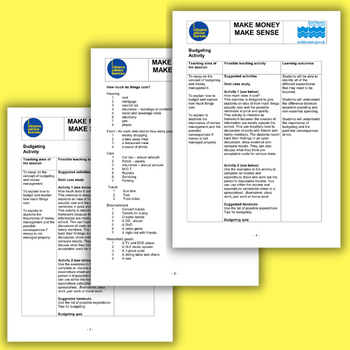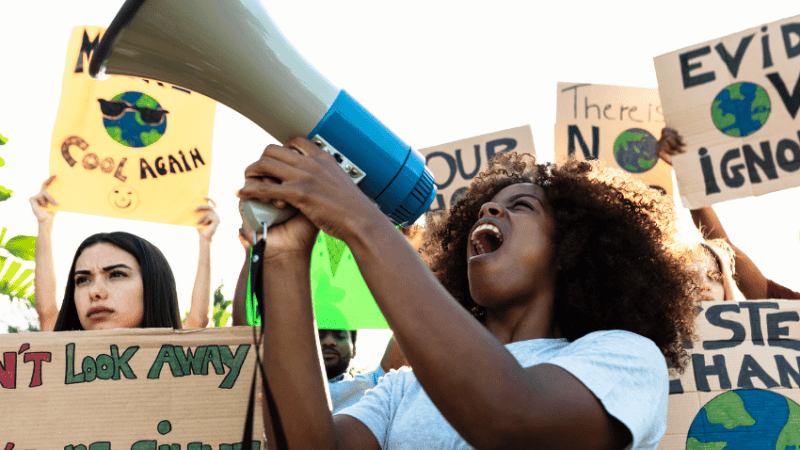Is There a Place for Politics in Schools? Absolutely, Right at the Heart of the Curriculum

School pupils may not be able to solve global problems, but they can learn why and how political action improves the world

Would your school support pupils campaigning about a controversial issue? Or would it keep controversy outside its gates? That was the challenge facing school principal Gill Kelly in Bristol.
Following a two-year project about female genital mutilation (FGM) with a local charity, a group of 17-year-old schoolgirls of Somali origin wanted to show their film, Silent Scream, to launch a campaign.
Parents and professionals worried that it would put the girls at risk, but the principal supported them.
In February 2014 they launched an online petition to ask the Secretary of State for Education to write to all head teachers about FGM. It was supported by the Guardian, UN Secretary General Ban Ki-moon and more than 230,000 signatories. Secretary of State Michael Gove eventually met the students and sent guidance on FGM to schools.
Concern about FGM was raised at least 100 years ago by Egyptian doctors, but it was ignored. Hundreds of millions of women have suffered since. Decades of campaigning are at last beginning to stop the practice.
And FGM is just one of many problems crying out for action. Child abuse, rape and violence against women occur everywhere. Climate change, homelessness, obesity and countless other problems need political commitment and ability.
Protect and empower
School pupils cannot solve these problems. But they can learn why and how political action improves the world.
Young people are often aware of problems, such as bullying, child abuse or substance misuse. They can also act on issues that concern them, like the Bristol school girls, with guidance and support from adults. In the process they develop confidence, knowledge and skills as effective citizens.
Ignoring young people’s desire to act on issues can have damaging consequences. If politics are only ever discussed in the abstract, they become bored and switch off. Or they may seek their own path and join an anti-democratic group that proactively addresses things they care about.
Democratic politics is central to British society. It is how we solve collective problems. It decides how 40% of national income is spent and affects every job, home and locality.
Yet most people do not know how the system works or how to influence decisions which shape their lives. The knowledge economy means that everyone needs political skills of critical thinking, influencing, negotiating organizing, public speaking and teamwork.
But political issues need to be explored with care, as part of a whole school approach and dedicated lessons.
A model society
Over a century ago, the American educator John Dewey argued that schools should ‘be a miniature community, an embryonic society’ in which pupils develop ‘social power and insight’.
Dewey advocated schools ‘freeing individual capacity in a progressive growth directed to social aims’, insisting that the ‘full intellectual and social meaning of a vocation would include instruction in the historic background of present conditions; … and study of economics, civics, and politics, to bring the future worker into touch with the problems of the day and the various methods proposed for its improvement.
Above all, it would train power of re-adaptation to changing conditions so that future workers would not become blindly subject to a fate imposed upon them’ (Democracy and Education, 1916).
Adapting to change is even more urgent today, as artificial intelligence, automation, driverless vehicles and other innovations transform the world. They can free people from drudgery – or make most of humanity redundant.
The biggest challenges we face are political, and schools offer the best opportunity for young people to learn how to take part in addressing them.
Management theorist Charles Handy compared schools with city-states, displaying every form of governance from dictatorship to direct democracy.
All schools teach people how to behave through their ethos and rules.
Activities such as circle time, debating, peer mediation, project work, service learning, schools’ councils and Youth Parliament offer direct experience of decision-making.
These must be real decisions, with real consequences, in which young people seek compromise and consensus among themselves as well as with adults.
Time to engage
Political literacy also has to be on the timetable. Pupils need time to discuss issues, understand the wider context and learn how to have a say. Citizenship and political literacy is a challenging subject, requiring skills and knowledge to handle controversial issues. The timetable also gives subjects status; citizenship, civics and politics are as important for life as STEM.
Making time in the school timetable where issues are addressed in a spirit of openness and respect enables young people to deal with them.
Young people also need to see that action can bring about change. If nothing happens, they conclude that politics is pointless and they are powerless.
Politics is more complicated than shopping. Clicking a petition won’t deliver results like Amazon. That’s why young people need to learn about different kinds of action in a supportive, learning environment.
Many people worry that political education is subject to bias and indoctrination. The reality is that the content of instruction is less influential than how pupils are treated and wider social values.
In China, compulsory education in Marxism-Leninism and Mao Zedong Thought has not stopped a capitalist market economy from flourishing under a one-party state.
Education for democracy aims to teach people to think critically, question authority and take part in politics. This means ensuring that pupils consider all sides of an argument and consider evidence when discussing controversial issues. Democracy itself is the best inoculation against indoctrination.
First steps: introducing practical politics in your classroom
Any lesson can teach something about democratic politics by encouraging students to ask questions: What’s really going on here? Who has power? How do they use it? How are decisions made? Who benefits? Who loses? What is the right thing to do? What should be done when and how?
Questions like these can arise in any subject. They may be prompted by the news, a novel or film; by the Bible, Quran or other religious texts; or by economics, history, geography and science.
They can range from conduct in school to climate change, war and peace. At their heart is the question of democratic citizenship: if people think something is wrong or could be better, how can they learn to do something about it? They could:
- Run a weekly discussion about current or local affairs
- Invite politicians to talk about their work
- Visit the local council and use Parliament’s Education Service
- Develop democratic practices such as peer-mediation, debates, team projects and service learning
- Join organizations such as the Citizenship Foundation, Association for Citizenship Teaching, Youth Parliament, Young Mayor Network, Youth Council Network, Youth Voice
Titus Alexander is founder of Democracy Matters (democracymatters.org.uk) and a Fellow of the Bernard Crick Centre for Understanding Politics at Sheffield University. To purchase his book, Practical Politics: lessons in power and democracy (UCL IOE Press 2017), click here. Free extracts can be downloaded at practicalpolitics.global.











